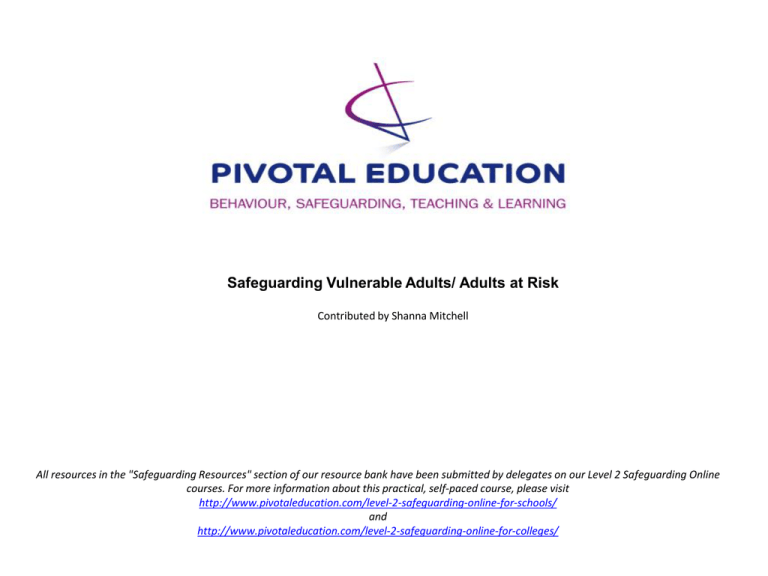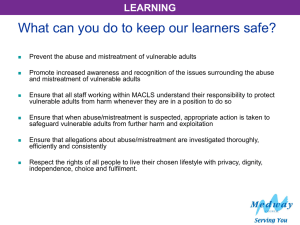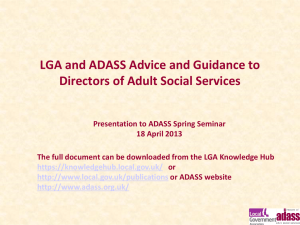Safeguarding Vulnerable Adults/ Adults at Risk
advertisement

Safeguarding Vulnerable Adults/ Adults at Risk Contributed by Shanna Mitchell All resources in the "Safeguarding Resources" section of our resource bank have been submitted by delegates on our Level 2 Safeguarding Online courses. For more information about this practical, self-paced course, please visit http://www.pivotaleducation.com/level-2-safeguarding-online-for-schools/ and http://www.pivotaleducation.com/level-2-safeguarding-online-for-colleges/ Safeguarding Vulnerable Adults/ Adults at Risk Supporting adults with Learning Disabilities to recognise abuse and what to do if they are someone else is at risk Shanna Mitchell Who is a vulnerable adult or Adult at risk? • An adult of risk can be defined as “a person aged 18 years or over who is or maybe in need of community care services by reason of mental and or other disability, age, illness; and who is or maybe unable to take care of himself or herself, or unable to protect himself or herself against significant harm or exploitation.” • Safeguarding Vulnerable Groups Act 2006 • Freedom Act 2012 Safeguarding means • Making sure you are safe from abuse and neglect and be able to be independent and make choices • Safeguarding is about making people aware of their rights, protecting them and preventing abuse How to explain safeguarding to individuals with learning disability • Social stories on specific safeguarding issues such as: • Rights and Respect • Choice • Inclusion and Empowerment • Protection • Prevention • Collective responsibility • • • • • • • • Supporting people with learning disabilities to understand what is meant by abuse Abuse is any action that causes harm to another person and which often results in a violation of human and civil rights. It includes: Physical abuse- this is usually the use of force to cause physical harm such as hitting, pinching, misusing medication etc. Sexual abuse- when someone touches your private parts and other body parts in ways that you don’t like or want and or forces you to take part in sexual activities Emotional abuse- when people talk to you in unkind or demeaning ways such as threats of harm, teasing, verbal abuse, intimidation etc. Financial abuse- when people take or control your inheritance, money, property, or things which belong to you without your agreement Neglect- This when those who are suppose to help and support you but don’t do this properly. Things such as ignoring your physical and medical needs and preventing your access to education, social care and health. Discriminatory abuse- This when people treat you unfairly because of the colour of your skin, your religion, your age, your disability and or because of your sexuality Intuitional abuse- this can sometimes happen at day centre, at college, in residential care, in hospital when you do not receive good and appropriate care and if your care, emotional and social needs are neglected affecting the whole service. Possible signs of abuse • • • • • • • • Physical abuse- bruising , factures, marks , not wanting to be touched Emotional/psychological abuse- being withdrawn, developmental delay, very eager to do everything they are asked Sexual abuse- behaving in a sexually inappropriate ways, not wanting to be touch, genital soreness and or sexually transmitted infections Financial abuse- not having enough money, having unusual financial difficulties, not paying bills, being over protective of their money and other properties Neglect- pain and discomfort, poor health, being very untidy and hungry Discriminatory abuse- a over critical carer or family member who makes insulting and degrading comments about the person, individual not being allowed to access the care they require, not being able to dress they want or access religious or cultural services as they require Institutional abuse- often no care plan in place, there has been instances where the individual has been treated badly or unsatisfactorily, individual often has no personal belongings or clothing The above list is only a guide of possible signs of abuse and not an entire list of the various forms and signs of abuse. Where does abuse happen? • Abuse can happen any where and at anytime and may include the following places: • At college • At day centre • In a care home • In your own home or in another persons home • In hospital • In a public place • At work Who might abuse a vulnerable/ adult at risk? • Anyone can abuse an adult at risk. This is often a person who has power over a vulnerable person at any time including: • A partner, family and or friends • Carer (informal or paid carer) • Colleague at work • Neighbour • stranger • A volunteer • A member of staff • Another service user What should I do I think I am being abuse or if I think that someone else is being abused? • You should tell some you trust. You must do this as soon as you can • The police (In an emergency call 999) • You can contact your local adult safeguarding team • A social worker • A care inspector • A staff who support you • A friend • Your Doctor • Your family If you tell someone that you have experienced abuse or are being abused A professional will want to help you and talk to you about this They will listen to what you have to say and take your concern seriously. Remember abuse is a crime • They will not judge you • They will speak to you privately but they may need to share relevant information with someone else who can help such as the police or a social worker (information will still be kept confidential) • They will reassure you that you have done the right thing in telling about your concern • They will investigate what you have said • They will have a meeting to help make a plan to protect you better Who is working to keeping adults at risk safe • Safeguarding adults at risk is a multiagency responsibility. • Social services and people who provide services such as day centres, colleges, home care should have: • Key policies and procedures in place including safeguarding, recognising abuse, protection, prevention, accountability. • Key Legislations include: • Human Rights Act 1988 • Safeguarding Vulnerable Groups Act 2006 • Equality Act 2010 • NHS Act 2006 • Mental Capacity Act 2005 • Mental Health Act 1983 • Sexual Offences Act 2003







